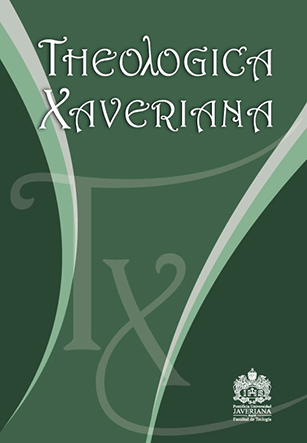Abstract
This paper argues that the evaluation of religious truth claims is one of the conditions for the possibility of interreligious dialogue. This thesis takes distance from the theories that, bracketing the truth of religious claims, suggest that it is enough with argumentative, pragmatic or ethical criteria for making dialogue possible. Firstly, it explores the role of truth in dialogue; then it analyses the features and functions of religious truth claims, showing its differences with regard to other types of truth. The last part presents two criteria to evaluate the truth of religious claims in dialogue—one based on the meaning-giving function of religion, and the other on the historical and relational character of religious truth.
Celam. V Conferencia del Episcopado Latinoamericano y del Caribe. Documento de Aparecida. Bogotá: San Pablo, 2007.
Clayton, Philip. Explanation from Physics to Theology. An Essay in Rationality and Religion. New Haven (CT)-London: Yale University Press, 1989.
Cobb, John. “Beyond ‘Pluralism’”. En Christian Uniqueness Reconsidered, editado por Gavin D’Costa, 81-95. Maryknoll (NY): Orbis, 1990.
Comisión Teológica Internacional. “El cristianismo y las religiones (1996)”. Vatican, http://www.vatican.va/roman_curia/congregations/cfaith/cti_documents/
rc_cti_1997_cristianesimo-religioni_sp.html (consultado el 2 de septiembre
de 2016)
Concilio Vaticano II. Documentos completos. Bogotá: San Pablo, 2006.
Consejo Pontificio para el Diálogo Interreligioso. “Diálogo y anuncio (1991)”. Vatican, http://www.vatican.va/roman_curia/pontifical_councils/interelg/documents/rc_pc_interelg_doc_19051991_dialogue-and-proclamatio_en.html (Consultado el 2 de septiembre de 2016)
Coward, Harold. Pluralism. Challenge to World Religions. Maryknoll (NY): Orbis, 1985.
D’Costa, Gavin (ed.). Christian Uniqueness reconsidered. Maryknoll (NY): Orbis, 1990.
Dupuis, Jacques. Hacia una teología cristiana del pluralismo religioso. Santander: SalTerrae, 2000.
Escuela Bíblica de Jerusalén. Biblia de Jerusalén. Bilbao: Desclée de Brouwer, 2009.
Francisco. “Carta del santo padre Francisco al periodista italiano Eugenio Scalfari del periódico La Repubblica, 13 de septiembre de 2013”. Vatican, https://w2.vatican.va/content/francesco/es/letters/2013/documents/papa-francesco_20130911_eugenio-scalfari.html (consultado el 2 de septiembre de 2016).
_____. Exhortación apostólica “Evangelii gaudium”. Bogotá: Paulinas: 2013.
Gilkey, Langdon. “Pluralism and Its Theological Implications”. En The Myth of Christian Uniqueness, editado por John Hick y Paul Knitter, 37-50. Maryknoll (NY): Orbis, 1987.
Gómez, Carlos Miguel. Diálogo interreligioso: el problema de su base común. Bogotá: Universidad del Rosario, 2008.
_____. “Fe y conocimiento. Investigación sobre la función epistémica de la creencia religiosa”. En ¿Ciencia o religión? Exploraciones sobre las relaciones entre fe y racionalidad en el mundo contemporáneo, editado por Luis Fernando Múnera, Raúl Meléndez y Carlos Miguel Gómez, 19-44. Bogotá: Editorial Javeriana- Editorial Universidad del Rosario, 2017.
_____. Interculturaliry, Rationality and Dialogue. In Search for Intercultrual
Argumentativa Criteria for Latiamerica. Würzburg: Echter, 2012.
Hick, John. An Interpretation of Religion. New Haven (CT): Yale University Press, 2004.
_____. Problems of Religious Pluralism. London: McMillan, 1985.
Hume, David. Investigación sobre el entendimiento humano. Bogotá: Norma, 1998.
Iglesia Católica. “Catecismo de la Iglesia Católica”. Vatican, http://www.vatican.va/archive/catechism_sp/index_sp.html (consultado el 9 de septiembre de 2016).
Knitter, Paul. One Earth Many Religions: Multifaith Dialogue and Global Responsibility.Maryknoll (NY): Orbis, 1995.
McGrath, Alister. A Scientific Theology: Nature. London: T&T Clark, 2006.
_____. Surprised by Meaning. Science, Faith and How We Make Sense of Things. Louisville (KY): WJK Press, 2011.
Múnera, Luis Fernando; Raúl Meléndez y Carlos Miguel Gómez (eds.). Ciencia y creación. La investigación científica de la naturaleza y la visión cristiana de la realidad. Santander- Bogotá: Sal Terrae-Editorial Javeriana (en proceso de publicación).
Panikkar, Raimon. The Intrareligious Dialogue. Revised Edition. New York (NY): Paulist Press, 1999.
Pannenberg, Wolfhart. “Is There Any Truth in God-Talk? The Problem of Theological Statements from the Perspective of Philosophy of Science”. En The Historicity of Nature. Essays on Science and Theology, editado por Niels Henrik Gregersen, 11-22. West Conshohocken (PA): Templeton Foundation Press, 2008.
_____. “What is Truth?” En Basic Questions in Theology. Vol. II, 1-27. Philadelphia (PA): Fortress Press, 1971.
Rorty, Richard. Contingencia, ironía y solidaridad. Barcelona: Paidós, 1991.
Tamayo, Juan José. Fundamentalismos y diálogo entre religiones. Madrid: Trotta, 2004.
Teixeira, Faustino. Teología de las religiones. Una visión panorámica. Quito: Abya Yala, 2005.
Twiss, Summer. “The Philosophy of Religious Pluralism: A Critical Appraisal of Hick and His Critics”. En The Philosophical Challenge of Religious Diversity, editado por Philip Quinn y Kevin Meeker, 67-98. New York (NY): Oxford University Press, 2000.
Wolterstorff, Nicholas. “Are Religious Believers Committed to the Existence of God?” En Practices of Belief. Selected essays. Vol. 2 Nicholas Wolterstorff, editado por Terence Cuneo, 350-371. New York (NY): Cambridge University Press, 2014.
This journal is registered under a Creative Commons Attribution 4.0 International Public License. Thus, this work may be reproduced, distributed, and publicly shared in digital format, as long as the names of the authors and Pontificia Universidad Javeriana are acknowledged. Others are allowed to quote, adapt, transform, auto-archive, republish, and create based on this material, for any purpose (even commercial ones), provided the authorship is duly acknowledged, a link to the original work is provided, and it is specified if changes have been made. Pontificia Universidad Javeriana does not hold the rights of published works and the authors are solely responsible for the contents of their works; they keep the moral, intellectual, privacy, and publicity rights.
Approving the intervention of the work (review, copy-editing, translation, layout) and the following outreach, are granted through an use license and not through an assignment of rights. This means the journal and Pontificia Universidad Javeriana cannot be held responsible for any ethical malpractice by the authors. As a consequence of the protection granted by the use license, the journal is not required to publish recantations or modify information already published, unless the errata stems from the editorial management process. Publishing contents in this journal does not generate royalties for contributors.


